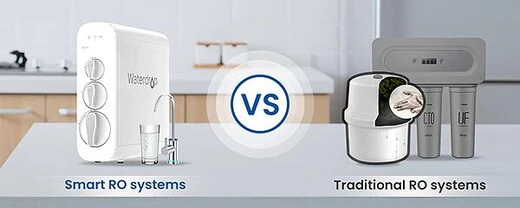Maintenance is critical, irrespective of the type of water purification
system you have. You will get more out of your filtration unit if you regularly clean its outside and inside.
There are both downsides and upsides to using the two kinds of water filtration systems. This article highlights
these with the view to help you make the right choice between both options.
Reverse Osmosis Explained
Reverse Osmosis, or RO, is an advanced water filtration technology with
extensive applications in the domestic sector. It converts source water, including high salinity water, into
safe, healthy, tasty, and fresh drinking water for household consumption.
Industrialization is on the rise, and so is the amount of impurities that
end up in water sources. Therefore, having an excellent RO water purifier is crucial to getting uncontaminated
water and staying healthy.
How RO Systems Work?
Reverse osmosis treats water through a continuous operation. It requires
pressure to force the source water through a thin, semi-permeable membrane. The passage separates the water
molecules from contaminant molecules. As the name suggests, it does the opposite of osmosis, which is the
natural movement of water with dissolved salts from lower to higher salt concentrations through a membrane.
RO systems are designed to overcome the natural osmotic pressure with the
help of external pressure. This is the only way the feedwater, alongside the dissolved salts and impurities, can
move through an advanced semipermeable membrane. The membrane separates the impurities from the water molecules,
leaving the user with highly-purified water. The system expels the concentrate and impurities solution through
its drain.
Tank RO Filters
The early water filter systems came with storage tanks added to make the
water flow faster. The purified water comes straight from the pressure tank, and you do not have to wait for
purification to happen to get filtered water.
What Are the Advantages?
These models of RO filters make it easy and fast to obtain safe and clean
drinking water. Their storage capability means you have water in the tank for future use, even when there is a
sudden cut-off of the water supply. They are also more popular, so you have more options to choose from.
What Are the Disadvantages?
The inclusion of a tank in tank RO filters means they require more space
under your kitchen sink. They are not suitable for smaller kitchen sinks. In addition, the presence of a tank
encourages the presence of secondary pollutants. Water heating and filtration are also slower, and you cannot
install most of these filtration systems on your own.
Tankless RO Systems
Reverse osmosis simply means the passage of water through a membrane by
applying force to one side of the membrane. The process is highly effective in expelling impurities from water.
Tankless RO systems, as the name suggests, do not have tanks. Rather than
store water, they filter water only on request. This comes with a few important advantages, including minimal
space requirement, absence of secondary contamination risk, and taste preservation.
What Are the Advantages?
Tankless RO systems are compactly designed, ensuring you require only
minimal under sink space to install them. You are at zero risk of contaminating your filtered water when using
tankless RO systems. The filtered water from these systems is cleaner and safer. They are also more efficient -
they produce less wastewater and reduce your water bill.
What Are the Disadvantages?
There are a few cons of the tankless RO filters. For example, they cannot
operate efficiently without electricity and do not store filtered water for future use. They are also expensive
and are limited in terms of makes and models available.
Finally
Both tank and tankless RO water filtration systems utilize the reverse
osmosis principle to purify water for drinking and other domestic uses. Your choice between the two will depend
on your family size and financial strength. Tankless RO systems are an excellent long-term investment for your
family. You should factor in the cost of filter replacements regardless of which one you end up with. Replacing
filters promptly will keep your filtered water fresh and free of impurities.



